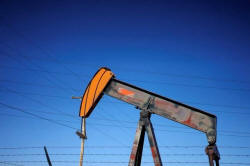Bullish oil streak propels Brent to strongest
third-quarter in 13 years
 Send a link to a friend
Send a link to a friend
 [September 29, 2017]
By Karolin Schaps [September 29, 2017]
By Karolin Schaps
AMSTERDAM (Reuters) - Oil edged higher on
Friday as tensions around Iraqi Kurdistan threatened the region's crude
supplies, helping Brent prices to their strongest third-quarter
performance since 2004.
Global benchmark Brent crude <LCOc1> was up 1 cent at $57.42 a barrel at
1122 GMT, notching up a third quarter gain of around 20 percent.
The contract had reached its highest in more than two years earlier in
the week, resulting in a fifth consecutive weekly gain. This performance
is Brent's longest weekly bull run since June 2016.
U.S. crude <CLc1> traded flat at $51.56 a barrel, on track for its
strongest third quarter in 10 years and its longest streak of weekly
gains since January.
"Oil prices remain firm with the backdrop of tensions between
Iraq/Turkey/Iran and Kurdistan still threatening to halt up to 600,000
barrels per day of production from the semi-autonomous region," said
Jamie Campbell, head of natural resources at Panmure Gordon.

Iraq's Kurds endorsed secession by nine to one in a referendum on Monday
that has angered Turkey, the central government in Baghdad, and other
powers, who fear the vote could lead to renewed conflict in the oil-rich
region.
Turkish President Tayyip Erdogan called the vote illegitimate and has
threatened to break with past practice and deal only with the Baghdad
government over oil exports from Iraq.
"No rapid solution to the crisis can be expected, which should continue
to lend support to the oil price," analysts at Commerzbank wrote.
[to top of second column] |

An oil well pump jack is seen at an oil field supply yard near
Denver, Colorado, U.S., February 2, 2015. REUTERS/Rick Wilking/File
Photo

Most oil that flows through a pipeline from Iraq to Turkey comes from Kurdish
sources and a cut-off would severely damage the Kurdish Regional Government,
which relies on sales of crude for almost all its hard currency revenues.
So far, oil flows through the pipeline have been normal.
Oil price gains have also been supported this month by anticipated renewed
demand from U.S. refiners that were resuming operations after shutdowns due to
Hurricane Harvey.
Even more bullish views have already started to appear in the oil options market
that has seen a spike in activity at $100 a barrel, indicating some oil bulls
are betting the price could trade around that level by this time next year.
However, Middle Eastern oil producers are concerned the recent price rise will
incentivize more U.S. shale production and push prices lower again.
(Additional reporting by Aaron Sheldrick in Tokyo; Editing by Dale Hudson and
Adrian Croft)
[© 2017 Thomson Reuters. All rights
reserved.] Copyright 2017 Reuters. All rights reserved. This material may not be published,
broadcast, rewritten or redistributed.
 |